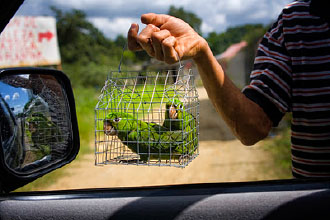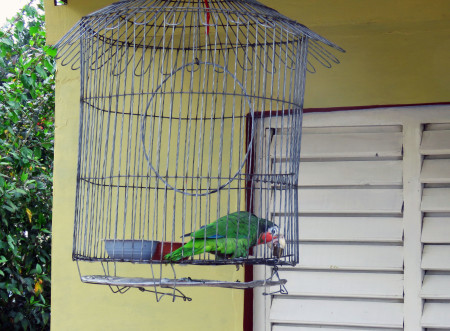
“Spread Your Wings for Bird Conservation” is the theme for this year’s celebration of the Caribbean Endemic Bird Festival. At dozens of events throughout the region, participants of all ages will learn about the different laws and programs that protect our unique birds and how everyone can participate in activities that help safeguard their long-term survival.
The festival, now in its 15th year, is led by BirdsCaribbean, the largest organization devoted to wildlife conservation in the Caribbean. The month-long festival includes Caribbean-wide activities beginning today – Earth Day (April 22), through to International Biodiversity Day (May 22), in more than twenty countries. The event celebrates the 173 bird species that are found only in the Caribbean, known as endemics. The highly successful program attracts over 80,000 participants and volunteers each year.
“Thanks to environmental laws, programs, and treaties set up to protect wild birds, there is a very good chance that our children and grandchildren will get to enjoy the same birds in their backyards, forests and wetlands that we do,” said Dr. Lisa Sorenson, Executive Director of BirdsCaribbean. “This has not always been the case and the result can be tragic.” A notable example is the extinction of the Cuban Macaw in the late 1800s due to hunting and capture for the pet trade.
Fortunately, far-sighted leaders came together to formulate international conventions and treaties that protect wildlife. For example, CITES – the Convention on International Trade in Endangered Species of Wild Fauna and Flora – was established in the 1960s to ensure that species threatened with extinction are not traded internationally. Another global agreement, the Convention on Biological Diversity, was set up in 1988 to increase biodiversity conservation.
Here in the Caribbean most countries have signed onto these and other conventions and treaties but it is up to each individual country to take action to protect their wildlife, for example, through Wild Bird Protection Acts and setting up parks and protected areas. Many have done so with great success but challenges remain. Illegal hunting and capture, sale and trade of wild birds is still a significant problem in some countries. Endemic parrots and parakeets are particularly vulnerable, as are migratory and resident or endemic songbirds such as bullfinches, orioles, buntings and warblers.

“Keeping wild birds as pets in cages is engrained in some Caribbean cultures,” commented Leo Douglas, President of BirdsCaribbean. “Through education campaigns carried out as part of our festival, we want to make sure people know that these activities are illegal and could cause a species to decline and eventually become extinct. It’s up to all of us to be good stewards of our environment so that our invaluable natural heritage is preserved for all Caribbean people to enjoy.”
The goal of the month-long Festival over its 15-year history has always been to increase public awareness of the region’s exceptionally rich and threatened bird life, using the Caribbean’s celebrated endemic birds as flagships of conservation. Festival activities include a diverse array of public events including bird-watching excursions, lectures, seminars, photographic exhibitions, school-based art and costume competitions, church services, media campaigns, and theatrical productions all in recognition of the region’s rich bird life, natural heritage, and interconnectedness of regional habitats to global events.
This year, festival participants will learn about actions that they can take to help conserve birds. Never buying wild-caught birds and reporting the capture and sale of wild birds to the authorities is very important. Educating your fellow citizens and asking your government to prioritize bird and habitat conservation is another great way to contribute to the cause—our birds are worth much more alive in nature than in a cage in another country! Finally, planting native trees for birds and supporting local environmental groups that work to conserve nature can provide a big boost to birds.
To view reports and photos of past Caribbean Endemic Bird Festivals, for downloadable Festival resources, and for updates on ongoing and planned activities in your area, visit the Celebrate Birds page at www.birdscaribbean.org

Your article is complete except …it doesn’t precise where is the Festival ?
Hello Gressier, Thanks for your comment and good question! Festival activities are celebrated at many events throughout the Caribbean islands. YOU can see some activities promoted on our Facebook page (Caribbean Bird Festivals) – if you are looking for an event in an specific country or island, let us know and we will put you in touch with organizers. Ideally, in the future, we will have a map with activities, dates and times listed and also contact information. We are working on this for next year!